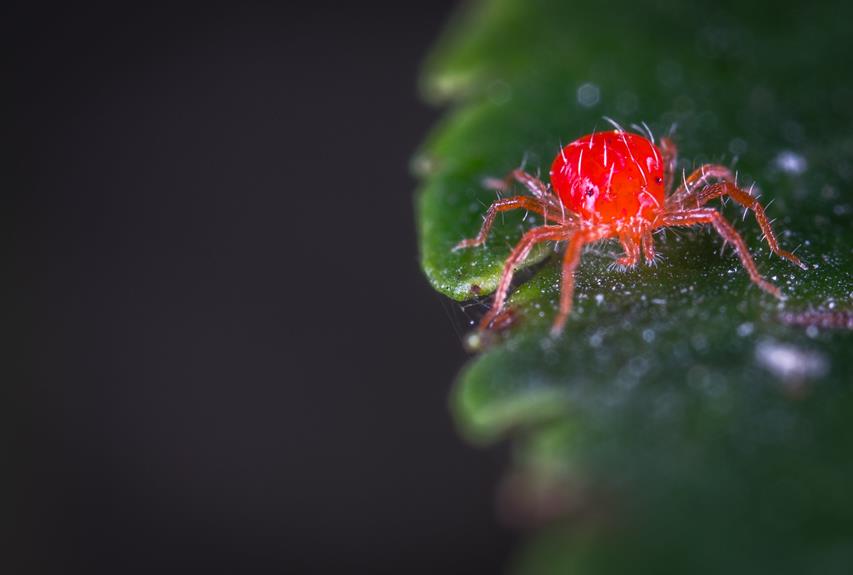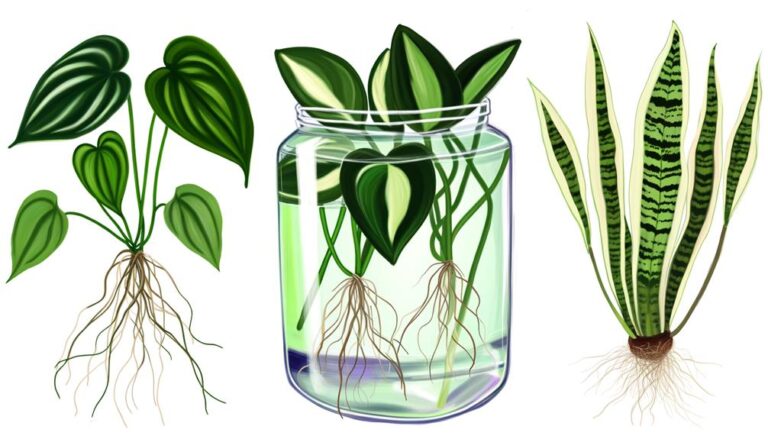11 Effective Tips for Outdoor Garden Pest Control
Did you know that gardeners worldwide lose approximately 30-40% of their crops to pests annually? It’s a challenge you’re certainly not facing alone. As you nurture your outdoor garden, it’s essential to protect it from those uninvited visitors.
You’ve got an arsenal of strategies at your fingertips, and we’re here to guide you through them. From encouraging natural predators to flourish in your green space to using organic insecticides judiciously, these 11 tips are about integrating you into a community of gardeners who value eco-friendly pest control.
Together, you’ll learn to implement floating row covers, cultivate pest-resistant varieties, and much more. Embrace these methods, and you’ll not only fortify your plants but also join forces with fellow green thumbs committed to keeping gardens healthy and thriving.
Encourage Natural Predators
Why not harness the power of nature by inviting natural predators to your garden as a frontline defense against pests? By attracting beneficial insects, including ladybugs, lacewings, and parasitic wasps, you foster a living shield against unwanted pests. These natural predators are adept at controlling pest populations, providing you with a sustainable solution that aligns with the rhythms of the ecosystem.
To attract beneficial predators, integrate nectar-rich flowers into your landscaping, which supply essential nutrients. Add small water features to offer hydration. By creating habitats that cater to their survival needs, you’ll encourage these allies to take up residence.
Employ Companion Planting
Incorporating companion planting into your garden strategy, you’ll experience the symbiotic benefits of plant pairings.
By selecting pest-repelling species, such as marigolds or basil, you can naturally deter garden pests while attracting beneficial insects.
This practice enhances biodiversity, creating a more resilient and self-regulating ecosystem in your outdoor space.
Plant Pairing Benefits
While you nurture your garden, employing companion planting can significantly enhance pest control by naturally repelling unwanted insects and attracting beneficial ones. Placing marigolds alongside your vegetables not only deters harmful pests but also draws pollinators, highlighting the symbiotic relationships between plant species.
Intersperse onions and garlic; their pest-repellent properties act as a natural barrier, safeguarding your cherished plants.
Experimenting with various combinations will establish the most effective natural pest management system for your unique garden. Incorporating native plants is particularly effective, as they evolved to attract these good bugs and thrive in local conditions.
Pest-repelling Species
You can enhance your garden’s defenses against pests by strategically planting species known for their repellent qualities. Marigolds, for instance, not only deter harmful pests but also attract pollinators, fostering a thriving community within your garden’s ecosystem.
By integrating onions and garlic, their pungent aroma acts as a natural shield, dissuading invaders such as aphids, flea beetles, and cabbage worms from feasting on your prized plants.
Companion planting optimizes space and resource use, with some varieties repelling pests while others attract beneficial insects. For example, small-flowered nectar plants lure parasitic wasps into your garden, which in turn eat aphids, effectively curbing their population.
This approach invites you into a fellowship with nature, working alongside beneficial organisms to protect and nurture your outdoor sanctuary.
Enhancing Biodiversity Naturally
Regularly integrating companion planting into your garden’s layout can naturally boost its biodiversity and strengthen your pest control strategy. This holistic approach involves:
Companion Planting Benefits:
- Attracts beneficial insects that prey on pests
- Adds organic matter to the soil, improving plant health
- Utilizes plants like marigolds to repel unwanted insects
By embracing the diversity of plants, you create a haven for helpful creatures that keep pest populations in check. Intercropping with pest-resistant vegetables and flowering herbs can further enhance this effect. Consider using diatomaceous earth as a natural deterrent and a floating row cover to protect vulnerable crops.
Together, these methods form a cohesive defense, fostering a sense of community among gardeners who value sustainable, effective pest control.
Implement Floating Row Covers
You’ll find that floating row covers offer a robust barrier against a variety of insects, including moths, beetles, and caterpillars that can devastate your garden plants.
Proper installation is crucial; ensure the covers are secured tightly to the ground to prevent pests from entering while allowing for plant growth.
Regular maintenance of these covers, including inspections for rips or gaps, is essential for their effectiveness in protecting your outdoor garden from pest invasions.
Barrier Against Insects
Implementing floating row covers provides an effective barrier to keep moths and other pests from harming your garden plants. These lightweight, breathable fabric covers aren’t only a shield against insects but also offer shade and frost protection. You’re not just controlling pests, you’re enhancing plant health and vitality.
Advantages of floating row covers:
- Physically block access to plants, preventing egg-laying and damage.
- Dual-purpose protection that includes a safeguard from harsh weather.
- Simple to install and maintain, with the ability to pin sides down securely.
Remember to lift the covers when plants flower to ensure pollinators can do their part. By using row covers, you’re creating a community of healthy plants, free from the stress of infestation.
Proper Installation Techniques
To maximize the effectiveness of your garden’s defense, ensure every floating row cover is properly installed with the edges secured to the ground. This method not only shields your tender seedlings from voracious pests but also fosters an environment where beneficial insects can thrive.
The key to success lies in maintaining good air circulation beneath the covers, which is crucial for promoting healthy plants. Carefully install the covers so they hover just above the plants, allowing room for growth while ensuring pests such as cabbage worms and cucumber beetles are kept at bay.
Regularly check and adjust the covers to accommodate your growing plants, reinforcing your garden’s resilience against invasive species without compromising its natural harmony.
Cover Maintenance Tips
Maintaining your floating row covers is essential to ensure they continue to protect your garden effectively from pests. These covers serve as a non-chemical barrier against a variety of Diseases and Pests, including moth larvae and beetles, safeguarding your plants without resorting to chemical treatments.
Regular Inspection:
- Check for tears: Repair promptly to prevent pest entry.
- Look for trapped beneficial insects: Gently release them to maintain ecological balance.
- Assess for wear and tear: Replace when necessary to sustain efficacy.
Cleanliness is also crucial; wash covers between seasons to remove any lingering pests or eggs.
Cultivate Pest-Resistant Varieties
You’ll significantly reduce your garden’s vulnerability to pests by choosing pest-resistant vegetable varieties. These specialized plants have evolved or been cultivated to be less attractive to common pests, making your gardening efforts more efficient and productive.
For instance, Butternut and Royal Acorn squash are known for their resistance to squash bugs. Similarly, the hairy-leaved King Harry potatoes naturally deter Colorado potato beetles.
Incorporating these pest-resistant varieties not only helps keep pests at bay but also supports the presence of beneficial insects that contribute to a healthy garden ecosystem.
Take a trip to your local garden center to explore the options available. By selecting the right varieties, you’re joining a community of gardeners committed to sustainable and resilient gardening practices.
Utilize Organic Insecticides
Organic insecticides can be your allies in the fight against garden pests, offering effective control without harming beneficial insects. When you’re part of a community that values sustainable practices, using organic insecticides like neem oil and insecticidal soap becomes a responsible choice. These products work by disrupting the life cycle of pests, while still being gentle on the ecosystem.
Neem oil:
- Targets aphids and other soft-bodied insects
- Acts as a growth regulator and repellent
- Safe for beneficial insects when used correctly
Insecticidal soap:
- Penetrates and disrupts insect cell membranes
- Effective against mealybugs and mites
- Biodegradable and minimizes environmental impact
Embrace these organic solutions to protect your garden and the community of life it supports.
Practice Crop Rotation
As you tend to your garden, consider practicing crop rotation to thwart pest lifecycles and prevent soil nutrient depletion.
By alternating the types of crops you plant in a given area, you not only disrupt the continuity that many pests rely on, but you also encourage biodiversity which can lead to a more resilient garden.
This strategic approach contributes to both the short-term health of your plants and the long-term stability of your garden ecosystem.
Prevents Soil Depletion
To prevent soil depletion and deter pests, it’s essential to rotate your crops annually. This strategic move not only keeps the soil nutrient-rich but also helps control pest populations in your garden. Here’s how crop rotation works in your favor:
Maintains Soil Health
- Prevents Soil Depletion: Rotating crops avoids the constant drain of specific nutrients.
- Balances Nutrients: Different plants replenish varied nutrients, promoting a balanced soil ecosystem.
- Supports Beneficial Insects: Diverse plantings attract a range of beneficial insects that naturally control pest populations.
Disrupts Pest Lifecycles
By practicing crop rotation in your garden, you’ll effectively disrupt the lifecycles of pests that could otherwise become a recurring problem. This method prevents pests that overwinter in the soil from emerging to find their preferred host plants. Instead, they’re met with an unexpected crop, halting their reproduction and reducing their numbers.
Crop rotation also promotes the presence of beneficial insects, creating a naturally occurring defense system against pests. By moving crops around, you prevent the buildup of diseases and insects that are specific to certain plants.
You’re not just gardening; you’re stewarding a balanced ecosystem that thrives through change. Rotate your crops annually to maintain this balance, and you’ll cultivate a garden that’s both productive and resilient.
Encourages Biodiversity
You’ll enhance your garden’s biodiversity and resilience against pests by rotating your crops seasonally. This practice prevents specific pests from settling in, as they’re confronted with an ever-changing environment. Moving crops disrupts pest lifecycles, making it harder for them to establish a presence. Different plants attract varied beneficial insects that eat aphids and other pests. Your garden becomes less of a consistent target for any one pest species.
By doing so, you’ll keep pest control natural and effective. Planting legumes where nitrogen-depleting crops once were can deter insects, maintaining a nutrient-rich soil that supports a diverse plant life.
Encouraging biodiversity isn’t just about pest control; it’s about creating a flourishing ecosystem where you and your plants belong.
Maintain Garden Cleanliness
While keeping your garden tidy, you’re actively deterring pests by removing their potential breeding grounds. Regularly collect faded blooms, fallen leaves, and weeds in a pail or bucket.
This routine not only keeps your garden aesthetically pleasing but is also a practical defense against the accumulation of decaying plant matter that can attract unwanted bugs and promote fungal growth.
By maintaining cleanliness, you’re safeguarding your garden’s health and preventing the spread of diseases. Remember, a clean environment is less inviting to pests but can be highly conducive for beneficial insects.
These allies aid in controlling pest populations naturally, fostering a balanced ecosystem. Embrace this practice to keep your garden thriving and resilient against infestations.
Use Physical Barriers
Although physical barriers may seem simple, they’re an effective method to keep garden pests at bay. By creating a physical separation, you can protect your plants from an array of invaders:
Floating Row Covers:
- Deter moths and caterpillars
- Shield seedlings from flea beetles
Netting/Mesh Fences:
- Exclude Slugs and snails
- Prevent Japanese beetles from feasting
Insect Traps:
- Monitor and capture pests
- Indicate infestation levels
Carefully install these barriers around susceptible plants, ensuring edges are secured to prevent pests from sneaking in.
Using this scientific, detailed, and practical approach allows you to join the community of gardeners who’ve embraced a proactive stance in the battle against garden pests.
Introduce Beneficial Insects
Beyond physical barriers, you can bolster your garden’s defenses by introducing beneficial insects that naturally keep pest populations in check. Acquire ladybugs, lacewings, praying mantises, and parasitic wasps from trusted horticultural suppliers, and release them to combat aphids, mites, and harmful larvae. These allies eat aphids and other tiny attackers, helping to control bugs without chemical interference.
To ensure these beneficial insects thrive, avoid pesticides that could harm them. Create an inviting habitat with a variety of nectar-producing plants to provide carbohydrates, and maintain a population of prey insects for protein. By fostering a balanced ecosystem, these natural guardians help keep pests at bay, allowing your garden to flourish as part of a harmonious community.
Apply Diatomaceous Earth
You’ll find that diatomaceous earth is a formidable ally in your fight against garden pests. This all-natural substance, made from fossilized diatoms, offers a non-toxic way to control bugs that threaten your plants.
When using diatomaceous earth:
- Apply around the base of plants to form a barrier
- Ensure a fine dusting on the soil and plant stems
- Avoid the flowers to protect beneficial pollinators
This method is particularly effective against aphids, caterpillars, slugs, and snails. The microscopic sharp edges of diatomaceous earth cut through the exoskeletons of pests, leading to dehydration and death. However, remember to reapply after rain or watering, as moisture diminishes its effectiveness.
Integrating diatomaceous earth into your garden care routine can significantly diminish pest populations and foster a sense of community with fellow gardeners who share your commitment to eco-friendly practices.
Regularly Inspect Plants
Consistently inspecting your garden’s plants is essential to catch any unwelcome pests before they become a larger problem. By regularly examining leaves, stems, and blooms, you’ll identify invaders such as aphids, caterpillars, and mealybugs at the earliest stage. This vigilance allows for prompt action, such as handpicking slugs and snails or removing tent caterpillars and cabbage worms that threaten your vegetation.
Engage in this routine with a keen eye for detail, looking for signs of distress like unusual leaf discoloration or wilting, which often indicate the presence of pests. Early detection through diligent inspection is a cornerstone of effective garden pest control, fostering a sense of community among your plants by providing them with a secure and healthy environment to thrive.
Conclusion
In the endless battle against garden invaders, you’ve now become the ultimate pest-banishing warrior. Your plants will thrive, thanks to your savvy tactics—from harnessing predator power to strategic companion planting.
Embrace these tips, and watch your garden transform into an impenetrable fortress, where pests fear to tread! Remember, regular vigilance is your greatest weapon.
So arm yourself with knowledge, and your garden will be the envy of every green thumb on the block!






